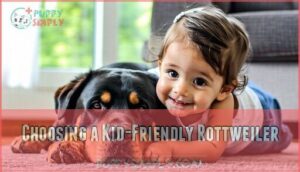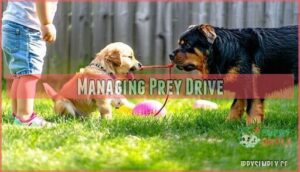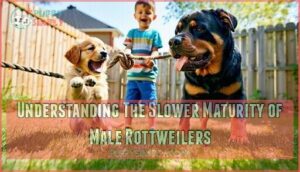This site is supported by our readers. We may earn a commission, at no cost to you, if you purchase through links.

These loyal, intelligent dogs naturally protect their families and often form strong bonds with children.
However, their size and strength require careful supervision – a playful 100-pound Rottweiler can accidentally knock over a small child.
Early socialization is essential for helping them learn appropriate behavior around kids.
They’re not naturally aggressive toward children, but like any large breed, they need consistent training and boundaries.
Their protective instincts make them wonderful guardians, though you’ll need to manage their territorial nature around unfamiliar children.
The key factors that determine success go beyond basic training and require a deeper understanding of their needs and behaviors to ensure they thrive as family pets, making them wonderful companions.
Table Of Contents
- Key Takeaways
- Rottweilers and Kids: What You Need to Know
- Choosing a Kid-Friendly Rottweiler
- Socializing Your Rottweiler Puppy
- The Benefits of Adopting a Rottweiler for Your Family
- Training Your Rottweiler as a Family Dog
- The Best Qualities of Rottweilers for Kids
- Potential Challenges and Dangers of Rottweilers With Kids
- Rottweilers and Babies: Tips for a Smooth Transition
- Frequently Asked Questions (FAQs)
- Do Rottweilers like to play with kids?
- Are Rottweilers safe with children?
- Are Rottweilers good family pets?
- Are Rottweilers Good Companions for children?
- Should you adopt a Rottweiler?
- Should you bring a Rottweiler into a home with children?
- Are Rottweilers safe for kids?
- What are the disadvantages of a Rottweiler?
- Can Rottweilers turn aggressive?
- Do Rottweilers bite children more than other breeds?
- Conclusion
Key Takeaways
- You’ll need consistent training and early socialization – Start exposing your Rottweiler puppy to children between 3-14 weeks old, using positive reinforcement to build proper behavior patterns that last throughout their life.
- Their size requires constant supervision around kids – At 80-135 pounds, even a gentle Rottweiler can accidentally knock over small children during play, so you cannot leave them unsupervised with toddlers.
- They’re naturally protective and loyal family companions – Your Rottweiler will instinctively guard your children and form strong bonds with them, making them excellent family guardians when properly managed.
- Success depends entirely on your commitment to boundaries – You must establish clear rules, provide structured training, and maintain consistent leadership to ensure safe interactions between your Rottweiler and children.
Rottweilers and Kids: What You Need to Know
You’re probably wondering if your family’s gentle giant can safely share your home with little ones.
The truth is, Rottweilers can be excellent with kids when properly trained and socialized, but their size and strength require careful consideration from parents.
Understanding Rottweiler Temperament
Understanding a rottweiler’s temperament is your first step toward creating a safe home environment.
While these dogs possess remarkable loyalty instincts and confident nature, their emotional sensitivity makes them excellent companions for families.
Key rottweiler temperament traits with kids include:
- Calm demeanor – naturally peaceful when properly socialized
- Obedience intelligence – quick learners who respond well to training
- Protective instincts – naturally watch over family members
- Emotional awareness – sensitive to household moods and stress.
Their rottweiler behavior around children depends heavily on early experiences and consistent training.
The Importance of Size in Rottweilers
A Rottweiler’s impressive size means they’re built like canine linebackers – weighing 80-135 pounds with powerful frames that can easily overwhelm small children.
These gentle giants pack serious muscle that can accidentally steamroll toddlers during playtime.
Their large size requires constant supervision around toddlers, as these big dogs can accidentally knock over youngsters during enthusiastic greetings or play sessions.
Understanding growth stages helps parents prepare for their Rottweiler’s changing needs. Puppies may seem manageable, but they quickly transform into substantial adults.
Their play style naturally involves body contact and wrestling, which works well with older kids but poses accidental injury risks for smaller ones.
Breed standards emphasize their robust build, making size supervision essential when rottweilers interact with kids. Smart parents establish boundaries early, teaching both their rottweiler and toddlers appropriate interaction rules.
While their protective nature makes them excellent family guardians, their sheer physical presence demands respect and careful management to guarantee everyone’s safety. This requires constant supervision and understanding of their powerful frames to prevent accidents, ensuring a safe environment for both the Rottweiler and the children, especially during enthusiastic greetings.
Choosing a Kid-Friendly Rottweiler
When you’re ready to bring a Rottweiler into your family, choosing the right dog can make all the difference in creating a safe environment for your kids.
Not all Rottweilers are equally suited for families with children, so you’ll want to focus on key traits that indicate good compatibility with young ones.
Early Socialization and Training
When you’re choosing a kid-friendly Rottweiler, puppy socialization becomes your foundation.
Start rottweiler training early with positive reinforcement and basic obedience commands.
Expose your puppy to children, different sounds, and environments regularly.
Combine leash training with crate training to establish structure.
This early investment in rottweiler socialization pays dividends when kids and rottweilers interact safely together.
Size and Playfulness Risks
Your playful giant might accidentally knock over toddlers during enthusiastic greetings or games.
Rottweilers and kids face accidental injuries when dogs don’t realize their strength.
Supervision needed during rough play helps prevent tumbles.
Their play style can overwhelm smaller children, so size awareness matters.
High energy levels mean they’ll unintentionally hurt kids without proper supervision.
Early training can help guarantee safe interactions between Rottweilers and children.
Obedience and Behavior Management
When selecting a Rottweiler for your family, solid obedience training becomes your best friend.
These powerful dogs need consistent boundaries and clear expectations to thrive alongside children safely.
- Command training starts early with basic commands like sit, stay, and come
- Leash manners prevent your 100-pound companion from dragging kids around
- Impulse control teaches patience during exciting moments with children
- Positive reinforcement builds trust while correcting problem behaviors effectively
- Ground rules establish consistent social training for all family interactions
Socializing Your Rottweiler Puppy
Early socialization helps your Rottweiler puppy develop into a well-adjusted family companion. Start puppy exposure during the critical socialization timeline between 3-14 weeks when they’re most receptive to new experiences. A key aspect involves understanding the critical socialization period for ideal development.
Positive reinforcement works best for rottweiler socialization with kids. The following steps are essential:
- Controlled introductions: Arrange supervised meetings with children of various ages in neutral settings
- Handling fear responses: Use calm reassurance when your puppy shows nervousness around loud or sudden movements
- Breed-specific training: Focus on gentle mouth control since Rottweilers naturally use their mouths during play
- Consistent boundaries: Teach appropriate rottweiler interaction through clear commands and immediate correction
Remember, socializing your Rottweiler puppy properly now prevents behavioral issues later. Dog socialization requires patience, but the payoff is a confident companion who knows how to behave around rottweilers kids interactions.
The Benefits of Adopting a Rottweiler for Your Family
When you’re considering a Rottweiler for your family, you’ll discover these dogs offer unique advantages that make them excellent companions for children.
Their combination of loyalty, intelligence, and protective instincts creates a powerful foundation for lasting family bonds.
Importance of Early Socialization
Your Rottweiler’s future with kids depends on what happens in those first few months.
Puppy exposure to children, sounds, and situations builds temperament stability that lasts a lifetime.
This behavior prevention approach creates the foundation for family integration, reducing aggression risks before they start.
| Socialization Window | Key Focus Areas |
|---|---|
| 8-12 weeks | Meeting children of different ages, gentle handling exercises |
| 3-4 months | Supervised child-dog interactions, basic command training |
| 4-6 months | Group play sessions, consistent boundaries with kids |
Early Rottweiler socialization isn’t just about meeting people—it’s about teaching your dog that children are part of their pack.
When Rottweilers’ kids relationships start young, you’re setting up a Rottweiler family dog that naturally understands boundaries and responds appropriately to different energy levels.
Training for Obedience and Behavior
Success hinges on consistent obedience training that transforms your Rottweiler into a well-mannered family companion.
You’ll build trust while teaching essential skills that protect your children during everyday interactions.
- Basic Commands – Teach sit, stay, down, and come to establish clear communication
- Leash Manners – Practice walking calmly without pulling or lunging around kids
- Impulse Control – Train "wait" and "leave it" to prevent overwhelming smaller children
- Crate Training – Create a safe space for breaks from child-dog interactions
- Positive Reinforcement – Reward calm behavior around children consistently
Consideration for Size and Energy Level
Most families find that a Rottweiler’s substantial size and boundless energy create unique considerations for households with children.
Understanding these factors helps you prepare for successful dog and child interaction.
| Size Considerations | Energy Management |
|---|---|
| Accidental Injuries: Large paws and strong tails can knock over toddlers during excited greetings | Exercise Needs: Requires 60-90 minutes daily activity to prevent destructive behaviors |
| Growth Stages: Puppies reach 70-80 pounds by 12 months, outgrowing children quickly | Playtime Supervision: High energy levels need structured play sessions with clear boundaries |
| Rottweiler Personality: Gentle giants who don’t realize their strength during affectionate moments | Familyfriendly Rottweiler: Proper dog energy outlets create calmer, more manageable companions |
Training Your Rottweiler as a Family Dog
Training your Rottweiler properly transforms them from a powerful breed into a gentle family companion who knows their place in your household.
You’ll need to focus on three key areas: socialization techniques, obedience training, and teaching your kids how to interact safely with their four-legged friend.
Socialization Techniques for Rottweilers
Three key strategies transform your Rottweiler into a family-friendly companion. Start with Puppy Socialization between 3-14 weeks, exposing your pup to children, sounds, and environments. Adult Socialization continues this process throughout their life.
Use Positive Reinforcement during Exposure Training – reward calm behavior around kids with treats and praise. Breed-Specific Socialization focuses on their protective instincts.
Practice controlled interactions where children approach slowly while you guide your Rottie’s responses. Dog parks and dog beaches provide controlled environments for socializing with other families.
Obedience school offers structured learning with distractions. Remember, you’re building a foundation where your Rottweiler sees children as pack members to protect, not threats to guard against. Consistency beats intensity – short, frequent sessions work better than marathon training days.
Obedience Training Tips
Every successful obedience training program starts with positive reinforcement—rewarding your Rottweiler when they get it right. You’ll want to focus on basic commands like sit, down, and heel, practicing these daily until they become second nature.
Command consistency is essential; if you say "sit" today, don’t switch to "sit down" tomorrow. Your Rottweiler needs clear, predictable signals.
Leash training should begin early, teaching your dog to walk calmly beside you rather than pulling ahead. This builds respect and control that transfers to all interactions.
Recall training—getting your dog to come when called—can be a lifesaver around children. A helpful tool is clicker training devices.
The key is integrating socialization with obedience training. Practice commands while kids are present, so your Rottweiler learns to obey even with distractions. Short, frequent training sessions work better than marathon practice periods.
Teaching Kids to Interact Safely With Rottweilers
Teaching your kids proper interaction with Rottweilers creates safer, stronger bonds between child and dog.
Start early with clear boundaries about respecting the dog’s space and recognizing warning signals.
Here are five essential safety rules for Rottweilers with toddlers:
- Always supervise interactions – Never leave children alone with any dog
- Teach gentle touches – Show soft petting, no pulling ears or tail
- Respect the dog’s boundaries – Let sleeping dogs lie, don’t disturb eating
- Recognize dog signals – Watch for stress signs like panting or backing away
- Avoid dominance games – No roughhousing or challenging behaviors
Consistent supervision and teaching these fundamentals guarantees positive dog-child interactions while maintaining everyone’s safety and comfort.
The Best Qualities of Rottweilers for Kids
Despite their intimidating appearance, Rottweilers possess several remarkable qualities that make them excellent companions for children.
You’ll discover that their natural protective instincts, combined with their patient temperament, create a perfect balance for family life.
Loyalty and Protective Nature
Beyond their impressive physical presence, Rottweilers possess an instinctual guarding nature that makes them exceptional family protectors.
Their unwavering loyalty creates strong family bonding while ensuring child safety through natural protective instincts. When properly trained, these dogs demonstrate remarkable emotional sensitivity, reading your family’s needs and responding accordingly.
Your Rottweiler’s guarddog instincts aren’t just about barking at strangers – they’re about creating a secure environment where your children can thrive. These dogs form deep connections with family members, especially becoming gentle guardians for toddlers who they instinctively recognize as vulnerable pack members.
- Protective alertness: They’ll monitor your home’s perimeter while remaining calm around familiar faces
- Emotional awareness: Rottweilers sense when family members need comfort or protection
- Selective guarding: They distinguish between genuine threats and everyday visitors through proper socialization
A Rottweiler with toddlers becomes a devoted sentinel, balancing protective vigilance with gentle companionship. Their loyalty runs deeper than simple obedience – it’s an emotional bond that transforms them into trusted family members who’ll stand guard over your most precious treasures.
Handling Rough Play With Children
While most large dogs can handle rough play, your Rottweiler’s sturdy build makes them particularly resilient during energetic child interactions. However, supervision importance can’t be overstated—their size means accidental knockdowns happen easily.
Rottweilers are known to be <strong>good-natured and placid</strong> when properly bred.
| Play Styles | Safe Approach | Injury Prevention |
|---|---|---|
| Wrestling/Tug-of-war | Redirect to fetch games | Prevents dominance issues |
| Chasing games | Structured activities only | Reduces herding instincts |
| Physical contact | Gentle petting/brushing | Teaches bite inhibition |
Child education about dog-child interactions guarantees everyone respects the dog’s boundaries. When your Rottweiler shows stress signals—yawning, turning away—intervene immediately.
Their dog size advantage means they won’t get hurt, but small children might during overly enthusiastic play sessions.
Guard Dog Instincts
Your Rottweiler’s protective instincts run deep, making them natural guardians for your family.
These dogs don’t just guard the home—they watch over every family member with unwavering dedication.
Their canine protective nature means they’ll instinctively position themselves between your children and potential threats.
However, instinct vs training makes all the difference.
Without proper guidance, protective behaviors can become problematic.
Your Rottweiler might view the mailman, visitors, or even playing children as threats requiring territory defense.
This is where early management becomes your best friend.
Start socializing your puppy immediately to distinguish between real dangers and everyday situations.
Teach them that not every stranger poses a threat to your family.
Supervised interactions help them learn appropriate responses to different scenarios.
When channeled correctly, rottweiler protection creates a loyal companion who’ll keep watch while your kids play in the yard.
Their dog guarding instincts become an asset rather than a liability, providing peace of mind while maintaining a welcoming home environment.
Intelligence and Obedience
One undeniable advantage of Rottweilers is their remarkable intelligence and natural obedience, making them exceptional family companions. These intelligent dogs possess high intelligence that enables rapid command learning, often mastering new instructions within just a few repetitions.
Their training ease sets them apart from many breeds, as they genuinely want to please their families. Rottweilers excel at problem solving and show impressive adaptability to household routines.
During obedience training, they demonstrate focused attention and respond well to consistent guidance. This mental stimulation keeps them engaged and prevents boredom-related behaviors.
Their obedient nature means they’ll reliably follow commands around children, whether it’s "gentle" during playtime or "stay" when excitement runs high. You’ll find that their willingness to learn creates enjoyable training sessions for the whole family, strengthening bonds while establishing important boundaries for safe interactions with kids.
Early socialization is key to ensuring child-friendly behavior.
Potential Challenges and Dangers of Rottweilers With Kids
While Rottweilers can be wonderful family dogs, you need to understand the potential risks before bringing one home with children.
Their size, strength, and protective instincts can create challenges that require careful management and consistent training.
Dealing With Dominant Personalities
While Rottweilers display wonderful qualities with children, their dominant personalities require careful management.
Male dominance can emerge without firm leadership and consistent training. You’ll need to establish boundaries early, becoming a consistent and firm leader who can correct their behaviors immediately.
Don’t fall for breed misconceptions about alpha dominance – these dogs simply need structure. Through proper training, you’ll channel their natural confidence positively, ensuring they respect family hierarchy while maintaining their protective instincts around your children.
Size and Physical Strength Considerations
While their hearts may be gentle, Rottweilers pack considerable physical power that demands your careful attention around children.
These strong dogs can weigh between 80-135 pounds, making accidental injuries a real concern during everyday interactions. Their enthusiasm during playtime can easily overwhelm smaller kids, even when they’re trying to be gentle.
Size management becomes vital when supervising your Rottweiler with children. Consider these key factors:
- Supervision needs – Always monitor interactions between big dogs and young children
- Play styles – Teach calm, controlled games rather than rough wrestling
- Strength training – Work on impulse control and gentle behavior commands
- Space awareness – Provide adequate room for safe play without crowding
- Age-appropriate interactions – Match activities to your child’s size and maturity level
Your physically strong companion doesn’t realize their own power, so establishing boundaries protects everyone involved.
Managing Prey Drive
When your Rottweiler’s prey drive kicks in around children, understanding this instinct becomes vital for child safety. Research shows that 38% of Rottweilers exhibit strong prey interest, making proper management essential.
You’ll need to focus on instinct training and redirecting behavior through consistent commands like "leave it" and "stay." Safe socialization from puppyhood helps reduce inappropriate prey responses later.
Leash control during walks prevents sudden pursuit behaviors, while secure fencing creates boundaries at home. Teaching prey alternatives through structured games like tug-of-war satisfies their natural instincts safely.
Dog supervision remains non-negotiable when kids are present, especially during high-energy play. Remember, protective instincts can quickly shift to chase behavior if triggered by running or squealing.
Early intervention with positive reinforcement builds impulse control, preventing potential dog aggression. Understanding protective aggression triggers is also key to preventing unwanted reactions.
Emergency recall commands require high-value rewards and should be practiced regularly. With proper training and awareness, you can successfully manage this natural drive while maintaining a safe environment for everyone.
Understanding The Slower Maturity of Male Rottweilers
Male Rottweilers mature slower than females, staying in a mischievous "hyperpuppy phase" until age two or three.
This delayed maturity means rougher play styles and testing boundaries longer than expected.
Your supervision needs increase substantially during this extended adolescent period, and training impact requires extra patience as behavioral differences emerge.
These males need consistent guidance through their prolonged development journey.
Rottweilers and Babies: Tips for a Smooth Transition
When you’re expecting a baby, you’ll need to prepare your Rottweiler for this major life change well before the little one arrives.
This shift requires careful planning and consistent training to guarantee your dog adapts smoothly to their new role as a gentle family guardian.
Preparing Your Rottweiler for The Arrival of a Baby
Getting your Rottweiler ready for bringing a baby home requires careful planning and gradual acclimation.
Start scent introduction by bringing baby blankets from the hospital before your little one arrives. Practice sound desensitization using recordings of crying babies.
Set up the nursery early, allowing supervised interactions with baby equipment. Use positive reinforcement when your dog remains calm around baby items, creating positive associations for successful dogs and babies integration.
Consider using baby scent introduction products to help your dog acclimate.
Ensuring Safety and Supervision
When your baby arrives, establishing bulletproof supervision strategies becomes your top priority for rottweiler safety. Never leave your Rottweiler alone with babies or toddlers, regardless of their previous behavior with children. This golden rule of dog and child safety rules protects everyone involved.
Here are three essential child-pet safety practices:
- Maintain constant adult presence during all interactions between your Rottweiler and baby
- Create physical barriers like baby gates to control access to nurseries and play areas
- Watch for stress signals in your dog, including panting, pacing, or withdrawal behaviors
Focus on child-dog education by teaching safe play boundaries early. Early training can help manage their potential dominant nature. Recognizing signs of overstimulation helps prevent incidents before they occur. Keep emergency protocols simple—know your vet’s number and have a backup plan for immediate dog removal if needed.
Frequently Asked Questions (FAQs)
Do Rottweilers like to play with kids?
Like puzzle pieces that fit perfectly together, Rottweilers absolutely love playing with kids! They’re energetic, adaptable playmates who match children’s enthusiasm while being sturdy enough to handle rough play safely.
Are Rottweilers safe with children?
Rottweilers can be safe with children when properly trained and socialized early. You’ll need constant supervision due to their size and strength, which could accidentally harm small kids during play.
Are Rottweilers good family pets?
Yes, Rottweilers can make excellent family pets when properly trained and socialized.
They’re loyal, protective, and affectionate with family members, though their size requires supervision around small children for everyone’s safety, which makes them loyal companions.
Are Rottweilers Good Companions for children?
Like a sturdy oak tree shielding young saplings, Rottweilers can be wonderful companions for children when properly trained and socialized.
Their protective nature, intelligence, and adaptability make them excellent family guardians and playmates.
Should you adopt a Rottweiler?
Consider adopting a Rottweiler if you’re an experienced owner who can provide consistent training, socialization, and exercise.
They’re loyal family dogs but require strong leadership and aren’t ideal for first-time owners.
Should you bring a Rottweiler into a home with children?
Every home needs a guardian, but not every guardian suits every castle.
You can bring a Rottweiler into your family if you’re committed to proper training, early socialization, and constant supervision with children under ten.
Are Rottweilers safe for kids?
When properly trained and socialized, these dogs can be safe companions for children. Their protective nature benefits families, but their size and strength require constant adult supervision during interactions.
What are the disadvantages of a Rottweiler?
Don’t put all your eggs in one basket with Rottweilers. They’re dominant, need firm training, can accidentally injure small children, and require extensive socialization to prevent territorial behavior.
Can Rottweilers turn aggressive?
Yes, Rottweilers can turn aggressive without proper training and socialization. Poor breeding, lack of structure, inadequate exercise, and improper handling increase this risk substantially in any dog.
Do Rottweilers bite children more than other breeds?
Statistical data shows Rottweilers aren’t inherently more likely to bite children than other breeds. However, their size and strength make any incident more serious than with smaller dogs.
Conclusion
Take Sarah’s family – their well-trained Rottweiler became their toddler’s gentle protector, always positioning himself between the child and strangers.
So, are Rottweilers good with kids? Yes, when you commit to proper training and socialization from day one.
These loyal giants can become wonderful family companions, but success depends entirely on your dedication to consistent boundaries, supervised interactions, and understanding their protective nature.
With the right approach, you’ll have a devoted guardian who’ll love your children unconditionally.
- https://www.aprpets.org/sites/americaspetregistry/uploads/documents/breeds/dogs/fun_facts/Rottweiler.pdf
- https://www.sciencealert.com/smartest-dog-breeds-canine-psychologist-intelligence-pets
- https://partnershipsforearlylearners.org/2019/05/09/rough-and-tumble-play/
- https://images.akc.org/pdf/breeds/standards/Rottweiler.pdf
- https://www.britannica.com/animal/Rottweiler















